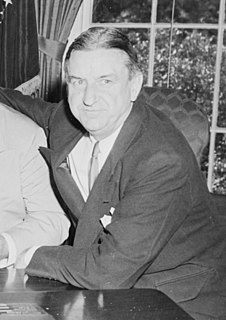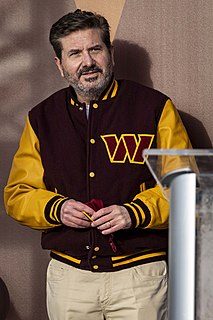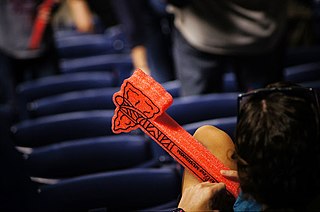Related Research Articles

The Washington Commanders are a professional American football team based in the Washington metropolitan area. The Commanders compete in the National Football League (NFL) as a member club of the league's National Football Conference (NFC) East division. The team plays its home games at FedExField in Landover, Maryland; its headquarters and training facility are in Ashburn, Virginia. The team has played more than 1,000 games and is one of only five in the NFL with more than 600 total wins. Washington was among the first NFL franchises with a fight song, "Hail to the Commanders", which is played by their marching band after every touchdown scored by the team at home. The franchise is valued by Forbes at US$5.6 billion, making them the league's sixth-most valuable team as of 2022.

George Preston Marshall was an American businessman best known for founding the Washington Redskins, an American football franchise belonging to the National Football League (NFL). He founded the team as the Boston Braves in 1932 and was its controlling owner until his death in 1969. Marshall, a supporter of racial segregation, was the last NFL owner to integrate African Americans onto a roster, only doing so in 1962 under pressure from the federal government, which threatened to block the use of D.C. Stadium, which they owned, unless he did.
"Hail to the Commanders" (HTTC) is the fight song of the Washington Commanders, an American football team belonging to the National Football League (NFL). At home games, the song is performed by the Washington Commanders Marching Band when the team scores a touchdown. Composed in 1937, the song was performed as "Hail to the Redskins" until 2019, when the team retired the controversial Redskins name.
Redskin is a slang term for Native Americans in the United States and First Nations in Canada. The term redskin underwent pejoration through the 19th to early 20th centuries and in contemporary dictionaries of American English it is labeled as offensive, disparaging, or insulting.

Daniel Marc Snyder is an American businessman and owner of the Washington Commanders, an American football team belonging to the National Football League (NFL). He bought the team, then known as the Washington Redskins, from Jack Kent Cooke's estate in 1999. Snyder's ownership of the team has been controversial, with accusations of a toxic workplace culture leading to a Congressional investigation, as well as the lack of success sustained by the team.

Pro-Football, Inc. v. Harjo, 415 F.3d 44, is a case in which the U.S. Court of Appeals for the District of Columbia considered the decision of the United States Patent and Trademark Office's Trademark Trial and Appeal Board (TTAB) to cancel the registration of the Washington Redskins football team, based on the claim that the name was disparaging to Native Americans. The Court of Appeals did not actually reach the merits of the TTAB's decision; it sent the case back to the trial court for consideration of a procedural issue.

Suzan Shown Harjo is an advocate for Native American rights. She is a poet, writer, lecturer, curator, and policy advocate who has helped Native peoples recover more than one million acres (4,000 km²) of tribal lands. After co-producing the first American Indian news show in the nation for WBAI radio while living in New York City, and producing other shows and theater, in 1974 she moved to Washington, D.C., to work on national policy issues. She served as Congressional liaison for Indian affairs in the President Jimmy Carter administration and later as president of the National Council of American Indians.

Since the 1960s, the issue of Native American and First Nations names and images being used by sports teams as mascots has been the subject of increasing public controversy in the United States and Canada. This has been a period of rising Indigenous civil rights movements, and Native Americans and their supporters object to the use of images and names in a manner and context they consider derogatory. They have conducted numerous protests and tried to educate the public on this issue.
The Washington Redhawks was a culture jam created by a group of Native Americans to draw attention to the Washington Redskins name controversy. In 2020, the team retired the Redskins branding amidst the removal of many names and images as part of the George Floyd protests. The football team was later renamed the Washington Commanders in 2022.

Arthur Raymond (Ray) Halbritter is an American businessman who is the current Nation Representative and CEO of Oneida Nation Enterprises, a major casino and tobacco conglomerate in Upstate New York. He is a member of the Oneida Indian Nation's Wolf Clan.

The Washington Redskins name controversy involved the name and logo previously used by the Washington Commanders, a National Football League (NFL) franchise located in the Washington metropolitan area. In the 1960s, the team's longtime name—the Redskins—and the associated logo began to draw criticism from Native American groups and individuals. The topic, part of the larger Native American mascot controversy, began receiving widespread public attention in the 1990s. In 2020, the team responded to economic pressure in the wake of widespread recognition of systemic racism by retiring the name and logo. The team called itself the "Washington Football Team" before rebranding as the Commanders in 2022.
Amanda Blackhorse is a social worker and member of the Navajo people who is known for her work as an activist on the Washington Redskins name controversy. She is the lead plaintiff in Blackhorse v. Pro-Football, Inc.
The Washington Redskins trademark dispute was a legal effort by Native Americans to define the term "redskin" to be an offensive and pejorative racial slur to deprive the owners of the NFL's Washington Redskins of the ability to maintain federal trademark protection for the name. These efforts had primarily been carried forward in two cases brought before the U.S. Patent and Trademark Office (USPTO). While prevailing in the most recent case in which the trademarks were cancelled, petitioners withdrew for further litigation now that the legal issue has become moot due to a decision in another case which found the relevant portion of the trademark law to be an unconstitutional infringement on freedom of speech.
Sports teams named Redskins are part of the larger controversy regarding the use of Native American names, images and symbols by non-native sports teams. Teams of this name have received particular public attention because the term redskin is now generally regarded as disparaging and offensive.
During the years of increasing awareness of the Washington Redskins name controversy, public opinion polls were part of the discussion about whether Native Americans found the term redskin insulting. Other polls gauged how the general public viewed the controversy.
The use of terms and images referring to Native Americans/First Nations as the name or mascot for a sports team is a topic of public controversy in the United States and in Canada, arising as part of the Native American/First Nations civil rights movements. Since the 1960s, there have been a number of protests and other actions by Native Americans and others targeting the more prominent use of such names and images by professional franchises such as the Cleveland Indians and the Washington Redskins. However, discourse surrounding mascot usage by elementary, middle, and high schools has been prominent, as these entities are subject to public legislation and community input.
First Nations Development Institute is a nonprofit organization that assists Native American tribes, their communities, and Native nonprofits in economic development by providing technical assistance, training, policy, and the awarding of grants. Public education is another area of focus. It is based in Longmont, Colorado. Charity Navigator gave First Nations Development Institute a four-star rating.

The Chicago Blackhawks name and logo controversy refers to the controversy surrounding the name and logo of the Chicago Blackhawks, a National Hockey League (NHL) ice hockey team based in Chicago, Illinois. The use of terms and images referring to Native Americans/First Nations as the name or mascot for a sports team without permissions from or consultations with local Indigenous communities, is a topic of public controversy in the United States and Canada. Since the 1960s, as part of the indigenous civil rights movements, there have been a number of protests and other actions by Native Americans and their supporters targeting the more prominent use of such names and images by professional franchises such as the Cleveland Guardians formerly known as the "Indians" of Major League Baseball (MLB) that was officially discontinued in 2016; the Washington Commanders formerly known as the "Redskins" of the National Football League (NFL), the NFL's Kansas City Chiefs and MLB's Atlanta Braves, the latter two attracting criticism of "the tomahawk chop" often performed by their fans. Like other teams with tribal mascots, there are calls from Indigenous activists and organizations to change the Blackhawks' name and logo and eliminate tribal mascots and imagery throughout sports. In contrast to generic names used by other teams, Blackhawks refers to a World War I-era U.S. Army battalion which was named for prominent Illinois-based Native American chief Black Hawk.
The Kansas City Chiefs were the last professional team in the United States to adopt a name or logo referencing Native Americans, although indirectly. When the Dallas Texans (AFL) relocated in 1963 they became the Chiefs in honor of Kansas City mayor Harold Roe Bartle who was instrumental in bringing the Texans to Kansas City, Missouri. Bartle earned his nickname as founder of a Boy Scouts honor camping society, Tribe of Mic-O-Say, in which he was "Chief" Lone Bear.
References
- ↑ "Redskins' Dan Snyder launches Original Americans Foundation". NFL.
- 1 2 Mike Jones (March 24, 2014). "Daniel Snyder starting Washington Redskins Original Americans Foundation". The Washington Post.
- ↑ Alex Fitzpatrick (March 24, 2014). "Redskins Owner Announces Washington Redskins Original Americans Foundation". Time, Inc.
- ↑ McDonald, Scott (July 1, 2020). "Washington Redskins Urged to Lose Name, or Millions in Sponsorships". Newsweek . Retrieved July 3, 2020.
- ↑ Clarke, Liz (July 2, 2020). "FedEx calls on Redskins to change name following investors' demands on sponsors". The Washington Post .
- ↑ Carpenter, Les; Maske, Mark (July 23, 2020). "NFL franchise to go by 'Washington Football Team' this season, delaying permanent name change". The Washington Post.
- ↑ Schad, Tom (November 18, 2020). "Washington Football Team ends relationship with Daniel Snyder's charitable foundation for Native Americans". USA Today.
- ↑ Erik Brady (November 6, 2013). "Redskins' Daniel Snyder meets with Alabama tribe". USA Today.
- ↑ Theresa Vargas; Liz Clarke (December 21, 2013). "Redskins owner Dan Snyder makes visits to Indian Country amid name-change pressure". The Washington Post.
- 1 2 Jim Enote (August 11, 2014). "We Are Not Redskins". Indian Country Today.
- ↑ Erik Brady (August 11, 2014). "Tribal member says Dan Snyder dismissed name complaint". USA TODAY Sports.
- ↑ Theresa Vargas; Tom Jackman (March 28, 2014). "CEO of new Washington Redskins foundation connected to 'defective' federal contract". The Washington Post.
- ↑ Matt Connolly (March 28, 2014). "Washington NFL Team's New Native American Foundation Is Already Off to a Great Start". Mother Jones.
- 1 2 Will Hobson (November 18, 2020). "Harassment claims and dwindling donations: The fall of Daniel Snyder's nonprofit for Native Americans". The Washington Post.
- ↑ Tim Daniels (March 26, 2014). "Roger Goodell Stands by Washington Redskins Keeping Controversial Name". Bleacher Report, Inc. Turner Broadcasting System, Inc.
- ↑ Theresa Vargas; Mike Jones (March 25, 2014). "New Redskins foundation is helping tribes, but it won't quell name controversy". The Washington Post.
- ↑ Brian Cladoosby (April 4, 2014). "The first project for Snyder's foundation: Changing a name". The Washington Post.
- ↑ "Snyder Wins: How 'CancelColbert' Drowned Out the Native Voice". April 1, 2014.
- ↑ Noah Rothman (March 26, 2014). "Olbermann: If Redskins Isn't 'Racist,' Why Doesn't Dan Snyder Call Native Americans That?".
- ↑ John Keim (March 27, 2014). "Senator: Foundation won't fix issue". ESPN.com.
- ↑ "McCollum Responds to Continued Use of Racist Native American Mascot By NFL Owner Dan Snyder". March 25, 2014.
- ↑ David Treuer (April 2, 2014). "The Price of a Slur". The New York Times.
- ↑ Rick Cohen (March 26, 2014). "3 Objections to Dan Snyder's Washington Redskins Original Americans Foundation". Nonprofit Quartlerly. Retrieved November 15, 2015.
- ↑ Erik Brady (August 5, 2014). "Nonprofit group criticizes Washington NFL team name". USA TODAY Sports.
- ↑ "Joint Affinity Groups Stand in Unity to Address Racism in Philanthropy" (PDF). August 14, 2014.
- ↑ "Washington Redskins not trying to buy Native American support with foundation, GM Bruce Allen says". ESPN. Retrieved November 15, 2015.
- ↑ Clara Caufield (April 3, 2014). "Guest opinion: Needs of impoverished neighbors test journalist's principles".
- ↑ Brent Schrotenboer (April 12, 2014). "Redskins foundation golf event loses sponsor in protest". USA TODAY Sports.
- ↑ Erik Brady (April 13, 2014). "Washington Redskins foundation loses another event sponsor". USA TODAY Sports.
- ↑ Nicholet Deschine (April 15, 2014). "Snyder's Redsk*ns Hush Money and KTNN's Questionable Behavior".
- ↑ "Navajo President slams the National Indian Gaming Association". The Navajo Post. April 17, 2014.
- ↑ Matthew Hendley (July 17, 2014). "Yuma-Area Native Americans Blast Offer From Washington Redskins to Fund New Skate Park". Phoenix New Times.
- ↑ "Quechan Memorial Skatepark" . Retrieved July 19, 2014.
- ↑ Erik Brady (July 31, 2014). "Montana Indian tribe happy to take Redskins' money". USA TODAY Sports.
- ↑ Erik Brady (August 8, 2014). "Redskins foundation seeks Native artwork with team logo". USA TODAY Sports.
- ↑ John Woodrow Cox (January 15, 2016). "Redskins foundation gave $3.7 million to more than 20 tribes, the team says". The Washington Post.
- ↑ John Woodrow Cox (April 15, 2017). "Donations to tribes by Daniel Snyder's Redskins foundation plummet in second year, records show". The Washington Post.
- ↑ Zielonka, Adam; Sinn, Dylan (December 19, 2017). "More than a Mascot: Redskins High Schools". Philip Merrill College of Journalism. Capital News Service. Retrieved December 20, 2017.
- ↑ Ronald Guy (March 28, 2015). "Washington Redskins: The Original Americans Foundation Falls Silent". football.com.
- ↑ Lindsay Whitehurst (April 3, 2015). "Utah tribe's leader removed from office over Redskins gifts". Associated Press.
- ↑ Kevin Jenkins (May 12, 2015). "Paiutes deny ex-chairwoman's appeal of her impeachment". The Spectrum.
- ↑ Phil Gover (2015-04-07). "Daniel Snyder's 'Gifts' to Natives Undermine and Corrupt" (Text). Indian Country Today Media Network. Retrieved 2015-04-08.
- ↑ John Woodrow Cox (August 5, 2015). "Native American tribe votes to reject $25,000 offered by Washington Redskins foundation". The Washington Post.
- ↑ Travis Waldron (September 4, 2015). "Native American Rodeo Breaks With DC Football Team's Charity Over 'Racial Slur' Name". The Huffington Post.
- ↑ Vrentas, Jenny; Rosenberg, Michael (July 8, 2020). "Dan Snyder Started a Foundation to Support Native Americans. Has It Abandoned Its Mission?". Sports Illustrated.
- ↑ Jay Caspian Kang (March 30, 2014). "The Campaign to "Cancel" Colbert". The New Yorker.
- ↑ "Snyder Wins: How 'CancelColbert' Drowned Out the Native Voice". Indian Country Today. April 1, 2014.